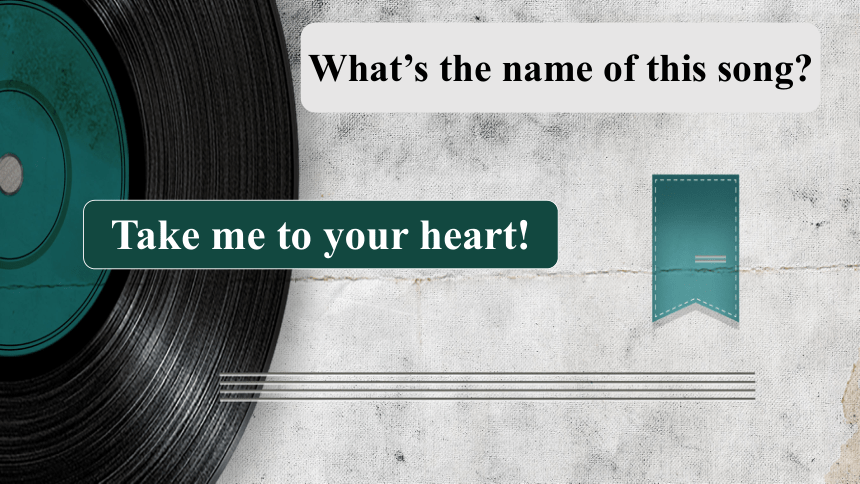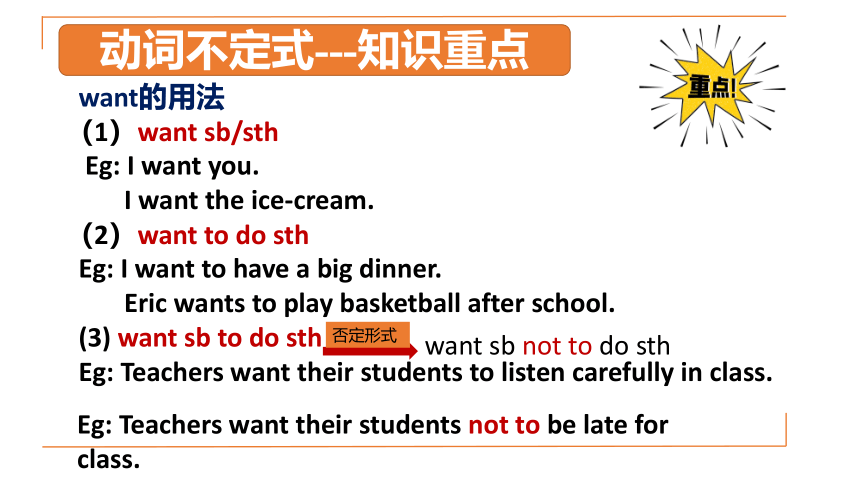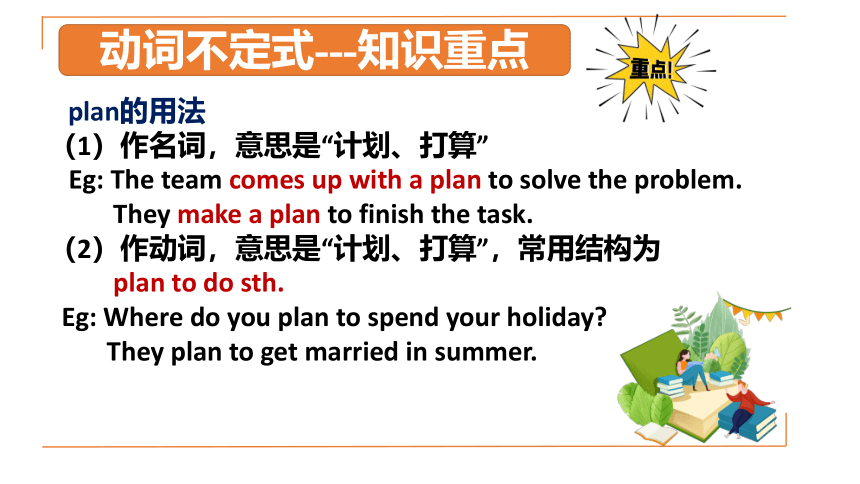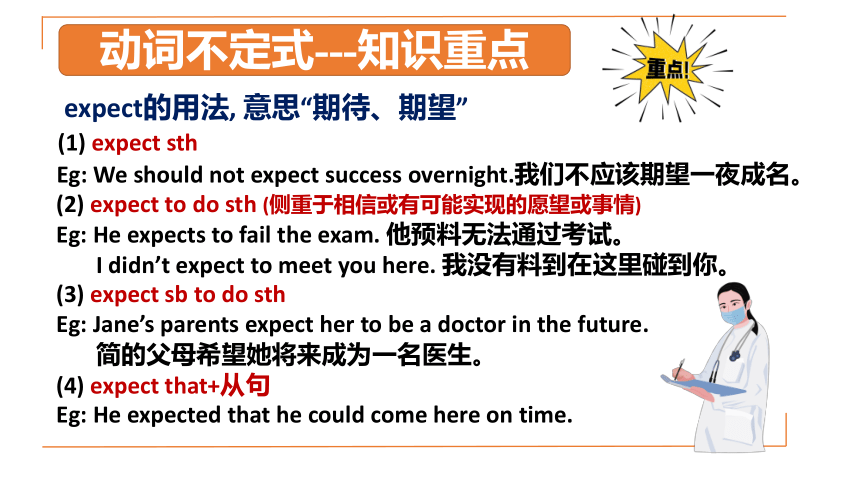Unit 5 Do you want to watch a game show?语法课件 (共30张PPT)
文档属性
| 名称 | Unit 5 Do you want to watch a game show?语法课件 (共30张PPT) |  | |
| 格式 | pptx | ||
| 文件大小 | 35.2MB | ||
| 资源类型 | 教案 | ||
| 版本资源 | 人教新目标(Go for it)版 | ||
| 科目 | 英语 | ||
| 更新时间 | 2022-08-15 19:27:00 | ||
图片预览












文档简介
(共30张PPT)
Do you want to watch a game
Section A Grammar Focus
Unit 5
What’s the name of this song
Take me to your heart!
Read these sentences aloud!
A: Do you want to watch a game show
B: Yes, I do./No, I don’t.
A: What do yo plan to watch tonight
B: I plan to watch Days of Our Past.
A: What do you expect to learn from sitcoms
B: You can learn some great jokes.
A: Why do you like watching the news
B: Because I hope to find out what’s going on around the world.
Do you find any rules
Infinitives---to do 动词不定式
动词不定式---构成
动词不定式的构成:最大的特点是动词后面接_______________, 例如:want to do, expect to do...,有时to可以省略,例如: help sb (to) do, 这里的to是不定式的符号,本身无词义。
to+动词原形
动词不定式---做主语
动词不定式做主语,常用it做形式主语,而句子的真正主语一般位于句子的句末,常见的结构为:It is + adj(形容词) (for sb) to do sth,意思是对于某人来说做什么事情怎么样。例如:It is difficult for me to learn English. 对我来说学习英语很难。而句子的真正主语是to learn English,原句子结构是To learn English is difficult for me.
动词不定式---做主语
注 意
在It is + adj (for sb) to do sth,这个结构中,若形容词为kind, good, nice, clever等表示人的品质这一类词,后面要用of而不用for。例如: It is very nice of you to help me. 你帮助我真是太好了。
动词不定式---做宾语
有些动词后面只能跟不定式做宾语,常常表示命令、打算、希望等,比如want, plan, expect, hope, wish,decide等,例如: I want to have a good rest after school.
I plan to go to a movie this weekend.
They decided to learn how to cook.
动词不定式---做宾语
注 意
在think, find后跟不定式做宾语时,常用it代替,而将真正的宾语放在后面。例如:
I find it easy to practice playing the guitar.
I think it good to do morning exercises every day.
动词不定式---知识重点
want的用法
(1)want sb/sth
Eg: I want you.
I want the ice-cream.
(2)want to do sth
Eg: I want to have a big dinner.
Eric wants to play basketball after school.
(3) want sb to do sth
Eg: Teachers want their students to listen carefully in class.
否定形式
want sb not to do sth
Eg: Teachers want their students not to be late for class.
动词不定式---知识重点
plan的用法
(1)作名词,意思是“计划、打算”
Eg: The team comes up with a plan to solve the problem.
They make a plan to finish the task.
(2)作动词,意思是“计划、打算”,常用结构为
plan to do sth.
Eg: Where do you plan to spend your holiday
They plan to get married in summer.
动词不定式---知识重点
plan的用法
(2)作动词,意思是“计划、打算”,常用结构为
plan to do sth.
Eg: Where do you plan to spend your holiday
They plan to get married in summer.
What do you/they plan to do
What does he/she plan to do
动词不定式---知识重点
expect的用法, 意思“期待、期望”
(1) expect sth
Eg: We should not expect success overnight.我们不应该期望一夜成名。
(2) expect to do sth (侧重于相信或有可能实现的愿望或事情)
Eg: He expects to fail the exam. 他预料无法通过考试。
I didn’t expect to meet you here. 我没有料到在这里碰到你。
(3) expect sb to do sth
Eg: Jane’s parents expect her to be a doctor in the future.
简的父母希望她将来成为一名医生。
(4) expect that+从句
Eg: He expected that he could come here on time.
动词不定式---知识重点
hope的用法, 意为“希望”
(1) hope to do sth 希望做某事(主观上愿望并对其实现抱有信心)
Eg: We hope to visit China one day.
(2) hope that
Eg: I hope that he will come.
He hopes (that) he will pass the exam.
1. Many teenagers hope______(be) a pop star.
2. What’s__________ (happen) over there There are a lot of people.
3.They________ (discuss) about the coming sports meeting just now.
4. His father planned________(build) a new house for the poor people.
5. Parents always expect their kids______(get) better grades than others.
6. He can’t stand________(share) his bedroom with his brother.
7. The latest news____(be)that the girl still can’t find her parents.
小试牛刀
to be
happening
discussed
to build
to get
sharing
is
hope to do
句中已有is
过去式标志词
plan to do
expect sb to do
stand doing sth忍受
句中缺少谓语动词
3a
Make a conversation and then practice it with a partner.
A: What do you plan to ________ tonight
B: I hope to ______________, but I also want to
_____________.How about you Do you
_________________________
A: Oh, I want to ___________.
B: That sounds______.
A: Yes,...
Do you want to watch the news Yes, I do./ no, I don’t.
What do you plan to watch tonight I plan to watch Days of Our Past.
What can you expect to learn from sitcoms You can learn some great jokes.
Why do you like watching the news Because I hope to find out what’s going on around the world.
What do you think of talk shows I don’t mind them. / I can’t stand them./ I love watching them.
Grammar Focus
动词不定式变一般疑问句,在句首加助动词do或者does,句中的实义动词用动词原形;特殊疑问句的结构是特殊疑问词+一般疑问句。
Do you want to watch the news Yes, I do./ no, I don’t.
What do you plan to watch tonight I plan to watch Days of Our Past.
What can you expect to learn from sitcoms You can learn some great jokes.
Why do you like watching the news Because I hope to find out what’s going on around the world.
What do you think of talk shows I don’t mind them. / I can’t stand them./ I love watching them.
Grammar Focus
动词后既可以用to do 也可以用doing
CHANT
两个开始更喜欢
(start/begin/prefer)
爱憎分明要继续,
(love/like/hate/continue)
后悔停止记了忘,
(regret/stop/remember/forget)
努力尝试有打算。
(try/mean)
动词后既可以用to do 也可以用doing
start/begin
start/begin to do
start/begin doing sth
开始做......
prefer
prefer to do
prefer doing sth
更喜欢做......
prefer
like/love to do
like/love doing sth
喜欢做......
动词后既可以用to do 也可以用doing
hate
hate to do
hate doing sth
讨厌做......
continue
continue to do
continue doing sth
继续做......
动词后既可以用to do 也可以用doing
regret
regret to do sth
regret doing sth
遗憾要做...(未做)
stop
stop to do sth
stop doing sth
停下来做......(未做)
后悔做过...(已做)
Eg: My grandfather regrets to visit Beijing.(遗憾没有去过。)
I regret telling you the news.(后悔告诉对方这个消息)
意思不同
注意辨析
停止做......(已做)
Eg:I stop to sing .(还没开始唱。)
The little baby stopped crying.(已经哭过了。)
动词后既可以用to do 也可以用doing
remember
remember to do sth
remember doing sth
记得去做...(未做)
forget
forget to do sth
forget doing sth
忘记去做......(未做)
记得做过...(已做)
Eg: I remember to tell him the news.(没有告诉。)
I remember seeing her once.(记得见过她。)
意思不同
注意辨析
忘记做过......(已做)
Eg:I forget to do my homework .(作业没做。)
Jenny’s grandmother forgets closing the window.(已经关了。)
动词后既可以用to do 也可以用doing
try
try to do sth
try doing sth
努力做......
mean
mean to do sth
mean doing sth
打算做......
尝试做...
Eg: I am always trying to learn English.(我一直努力学习英语。)
Marry starts to try cooking.(玛丽开始尝试做饭。)
意思不同
注意辨析
意味着......
Eg:We mean to call on you tomorrow .(我们打算明天去看你。)
Success means working hard.(成果意味着努力工作。)
重点句型
What do you think of game shows
What do you think of ...
= how do you like… “你认为······怎么样 ”
谈论对某事物的喜好程度, 可选择的回答有:
I like it./I don't mind it./I don't like it./
I can't stand it./I like it very much./I love it./
It's beautiful./They're fantastic.
重点句型
2) think “想, 考虑, 思索”(v. 动词) 可以和许多介词搭配, 组成新的意思。
think of “考虑”; “有······的看法”, 有时等同于 think about.
Eg: What does he think of Beijing Opera
他对京剧有什么看法?
My mother always thinks of everything!
我妈妈总是想到所有的东西。
3b
Answer these questions.Give answers that are true for you.
1. What do you think of game shows
___________________________________
2. What comedy shows do you like to watch
___________________________________
3. Do you plan to watch a sports show tonight
___________________________________
4. What can you expect to learn from the news
_____________________________________
动词to do/doing
to do
remember doing
expect to do
plan to do
hope to do
want sb (not) to do
expect sb (not) to do
doing
want to do
forget doing
try doing
mean doing
两个开始更喜欢
(start/begin/prefer)
爱憎分明要继续,
(love/like/hate/continue)
后悔停止记了忘,
(regret/stop/remember/forget)
努力尝试有打算。
(try/mean)
Summary
What do you think of ...
1. 今晚你计划看什么?
__________ do you __________ __________ watch tonight
2. 你觉得这个喜剧片怎么样?
____________________ of the comedy
3. 我们应该互相帮助、互相学习。
We should help each other and __________ __________ each other.
4. 看游戏节目怎么样?
__________ __________ watching a game show
5. 你别期待他能帮你。
You can’t __________ __________ __________ help you.
What
plan to
What do you think
learn from
How/What about
expect him to
A: Hello, Jenny!
B: Hi, David!
A: 1_______
B: Well, I often watch TV at home.
A: Really 2 _______
B: I like to watch the news.
A: The news 3 _______
B: Because I can learn about what’s going on around
the world. I can learn a lot from it. 4 ______
Do you often watch TV, too
A:Yeah, but I don’t like the news. 5 ________
My favorite TV shows are talent shows and sports
shows. I think they’re really enjoyable and
wonderful.
A.What kind of TV shows do you like to watch?
B.I think it’s boring.
C.I often go to the movies with my friends.
D.What do you often do in your spare time
E.Why do you like it
F. What can you learn from them?
G.What about you
D
A
E
G
B
Do you want to watch a game
Section A Grammar Focus
Unit 5
What’s the name of this song
Take me to your heart!
Read these sentences aloud!
A: Do you want to watch a game show
B: Yes, I do./No, I don’t.
A: What do yo plan to watch tonight
B: I plan to watch Days of Our Past.
A: What do you expect to learn from sitcoms
B: You can learn some great jokes.
A: Why do you like watching the news
B: Because I hope to find out what’s going on around the world.
Do you find any rules
Infinitives---to do 动词不定式
动词不定式---构成
动词不定式的构成:最大的特点是动词后面接_______________, 例如:want to do, expect to do...,有时to可以省略,例如: help sb (to) do, 这里的to是不定式的符号,本身无词义。
to+动词原形
动词不定式---做主语
动词不定式做主语,常用it做形式主语,而句子的真正主语一般位于句子的句末,常见的结构为:It is + adj(形容词) (for sb) to do sth,意思是对于某人来说做什么事情怎么样。例如:It is difficult for me to learn English. 对我来说学习英语很难。而句子的真正主语是to learn English,原句子结构是To learn English is difficult for me.
动词不定式---做主语
注 意
在It is + adj (for sb) to do sth,这个结构中,若形容词为kind, good, nice, clever等表示人的品质这一类词,后面要用of而不用for。例如: It is very nice of you to help me. 你帮助我真是太好了。
动词不定式---做宾语
有些动词后面只能跟不定式做宾语,常常表示命令、打算、希望等,比如want, plan, expect, hope, wish,decide等,例如: I want to have a good rest after school.
I plan to go to a movie this weekend.
They decided to learn how to cook.
动词不定式---做宾语
注 意
在think, find后跟不定式做宾语时,常用it代替,而将真正的宾语放在后面。例如:
I find it easy to practice playing the guitar.
I think it good to do morning exercises every day.
动词不定式---知识重点
want的用法
(1)want sb/sth
Eg: I want you.
I want the ice-cream.
(2)want to do sth
Eg: I want to have a big dinner.
Eric wants to play basketball after school.
(3) want sb to do sth
Eg: Teachers want their students to listen carefully in class.
否定形式
want sb not to do sth
Eg: Teachers want their students not to be late for class.
动词不定式---知识重点
plan的用法
(1)作名词,意思是“计划、打算”
Eg: The team comes up with a plan to solve the problem.
They make a plan to finish the task.
(2)作动词,意思是“计划、打算”,常用结构为
plan to do sth.
Eg: Where do you plan to spend your holiday
They plan to get married in summer.
动词不定式---知识重点
plan的用法
(2)作动词,意思是“计划、打算”,常用结构为
plan to do sth.
Eg: Where do you plan to spend your holiday
They plan to get married in summer.
What do you/they plan to do
What does he/she plan to do
动词不定式---知识重点
expect的用法, 意思“期待、期望”
(1) expect sth
Eg: We should not expect success overnight.我们不应该期望一夜成名。
(2) expect to do sth (侧重于相信或有可能实现的愿望或事情)
Eg: He expects to fail the exam. 他预料无法通过考试。
I didn’t expect to meet you here. 我没有料到在这里碰到你。
(3) expect sb to do sth
Eg: Jane’s parents expect her to be a doctor in the future.
简的父母希望她将来成为一名医生。
(4) expect that+从句
Eg: He expected that he could come here on time.
动词不定式---知识重点
hope的用法, 意为“希望”
(1) hope to do sth 希望做某事(主观上愿望并对其实现抱有信心)
Eg: We hope to visit China one day.
(2) hope that
Eg: I hope that he will come.
He hopes (that) he will pass the exam.
1. Many teenagers hope______(be) a pop star.
2. What’s__________ (happen) over there There are a lot of people.
3.They________ (discuss) about the coming sports meeting just now.
4. His father planned________(build) a new house for the poor people.
5. Parents always expect their kids______(get) better grades than others.
6. He can’t stand________(share) his bedroom with his brother.
7. The latest news____(be)that the girl still can’t find her parents.
小试牛刀
to be
happening
discussed
to build
to get
sharing
is
hope to do
句中已有is
过去式标志词
plan to do
expect sb to do
stand doing sth忍受
句中缺少谓语动词
3a
Make a conversation and then practice it with a partner.
A: What do you plan to ________ tonight
B: I hope to ______________, but I also want to
_____________.How about you Do you
_________________________
A: Oh, I want to ___________.
B: That sounds______.
A: Yes,...
Do you want to watch the news Yes, I do./ no, I don’t.
What do you plan to watch tonight I plan to watch Days of Our Past.
What can you expect to learn from sitcoms You can learn some great jokes.
Why do you like watching the news Because I hope to find out what’s going on around the world.
What do you think of talk shows I don’t mind them. / I can’t stand them./ I love watching them.
Grammar Focus
动词不定式变一般疑问句,在句首加助动词do或者does,句中的实义动词用动词原形;特殊疑问句的结构是特殊疑问词+一般疑问句。
Do you want to watch the news Yes, I do./ no, I don’t.
What do you plan to watch tonight I plan to watch Days of Our Past.
What can you expect to learn from sitcoms You can learn some great jokes.
Why do you like watching the news Because I hope to find out what’s going on around the world.
What do you think of talk shows I don’t mind them. / I can’t stand them./ I love watching them.
Grammar Focus
动词后既可以用to do 也可以用doing
CHANT
两个开始更喜欢
(start/begin/prefer)
爱憎分明要继续,
(love/like/hate/continue)
后悔停止记了忘,
(regret/stop/remember/forget)
努力尝试有打算。
(try/mean)
动词后既可以用to do 也可以用doing
start/begin
start/begin to do
start/begin doing sth
开始做......
prefer
prefer to do
prefer doing sth
更喜欢做......
prefer
like/love to do
like/love doing sth
喜欢做......
动词后既可以用to do 也可以用doing
hate
hate to do
hate doing sth
讨厌做......
continue
continue to do
continue doing sth
继续做......
动词后既可以用to do 也可以用doing
regret
regret to do sth
regret doing sth
遗憾要做...(未做)
stop
stop to do sth
stop doing sth
停下来做......(未做)
后悔做过...(已做)
Eg: My grandfather regrets to visit Beijing.(遗憾没有去过。)
I regret telling you the news.(后悔告诉对方这个消息)
意思不同
注意辨析
停止做......(已做)
Eg:I stop to sing .(还没开始唱。)
The little baby stopped crying.(已经哭过了。)
动词后既可以用to do 也可以用doing
remember
remember to do sth
remember doing sth
记得去做...(未做)
forget
forget to do sth
forget doing sth
忘记去做......(未做)
记得做过...(已做)
Eg: I remember to tell him the news.(没有告诉。)
I remember seeing her once.(记得见过她。)
意思不同
注意辨析
忘记做过......(已做)
Eg:I forget to do my homework .(作业没做。)
Jenny’s grandmother forgets closing the window.(已经关了。)
动词后既可以用to do 也可以用doing
try
try to do sth
try doing sth
努力做......
mean
mean to do sth
mean doing sth
打算做......
尝试做...
Eg: I am always trying to learn English.(我一直努力学习英语。)
Marry starts to try cooking.(玛丽开始尝试做饭。)
意思不同
注意辨析
意味着......
Eg:We mean to call on you tomorrow .(我们打算明天去看你。)
Success means working hard.(成果意味着努力工作。)
重点句型
What do you think of game shows
What do you think of ...
= how do you like… “你认为······怎么样 ”
谈论对某事物的喜好程度, 可选择的回答有:
I like it./I don't mind it./I don't like it./
I can't stand it./I like it very much./I love it./
It's beautiful./They're fantastic.
重点句型
2) think “想, 考虑, 思索”(v. 动词) 可以和许多介词搭配, 组成新的意思。
think of “考虑”; “有······的看法”, 有时等同于 think about.
Eg: What does he think of Beijing Opera
他对京剧有什么看法?
My mother always thinks of everything!
我妈妈总是想到所有的东西。
3b
Answer these questions.Give answers that are true for you.
1. What do you think of game shows
___________________________________
2. What comedy shows do you like to watch
___________________________________
3. Do you plan to watch a sports show tonight
___________________________________
4. What can you expect to learn from the news
_____________________________________
动词to do/doing
to do
remember doing
expect to do
plan to do
hope to do
want sb (not) to do
expect sb (not) to do
doing
want to do
forget doing
try doing
mean doing
两个开始更喜欢
(start/begin/prefer)
爱憎分明要继续,
(love/like/hate/continue)
后悔停止记了忘,
(regret/stop/remember/forget)
努力尝试有打算。
(try/mean)
Summary
What do you think of ...
1. 今晚你计划看什么?
__________ do you __________ __________ watch tonight
2. 你觉得这个喜剧片怎么样?
____________________ of the comedy
3. 我们应该互相帮助、互相学习。
We should help each other and __________ __________ each other.
4. 看游戏节目怎么样?
__________ __________ watching a game show
5. 你别期待他能帮你。
You can’t __________ __________ __________ help you.
What
plan to
What do you think
learn from
How/What about
expect him to
A: Hello, Jenny!
B: Hi, David!
A: 1_______
B: Well, I often watch TV at home.
A: Really 2 _______
B: I like to watch the news.
A: The news 3 _______
B: Because I can learn about what’s going on around
the world. I can learn a lot from it. 4 ______
Do you often watch TV, too
A:Yeah, but I don’t like the news. 5 ________
My favorite TV shows are talent shows and sports
shows. I think they’re really enjoyable and
wonderful.
A.What kind of TV shows do you like to watch?
B.I think it’s boring.
C.I often go to the movies with my friends.
D.What do you often do in your spare time
E.Why do you like it
F. What can you learn from them?
G.What about you
D
A
E
G
B
同课章节目录
- Unit 1 Where did you go on vacation?
- Section A
- Section B
- Unit 2 How often do you exercise?
- Section A
- Section B
- Unit 3 I'm more outgoing than my sister.
- Section A
- Section B
- Unit 4 What's the best movie theater?
- Section A
- Section B
- Unit 5 Do you want to watch a game show?
- Section A
- Section B
- Unit 6 I'm going to study computer science.
- Section A
- Section B
- Unit 7 Will people have robots?
- Section A
- Section B
- Unit 8 How do you make a banana milk shake?
- Section A
- Section B
- Unit 9 Can you come to my party?
- Section A
- Section B
- Unit 10 If you go to the party, you'll have a grea
- Section A
- Section B
